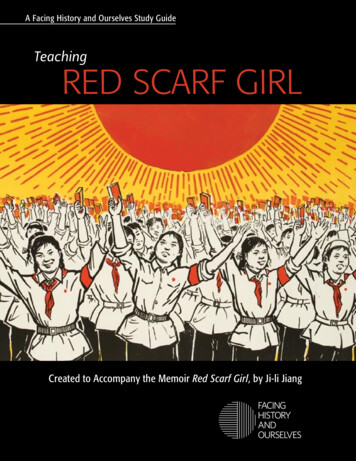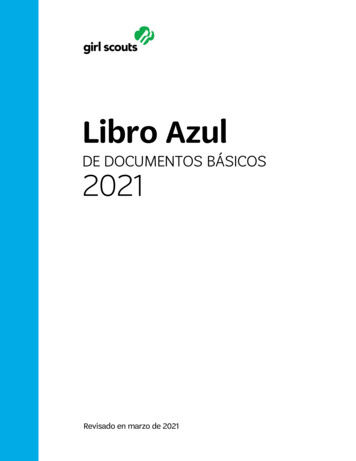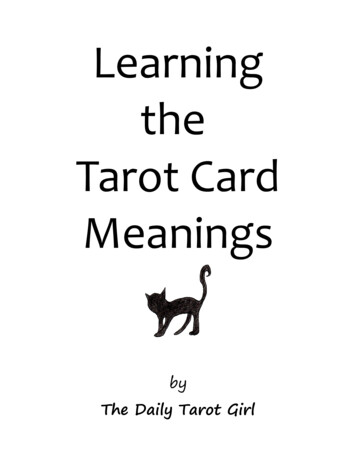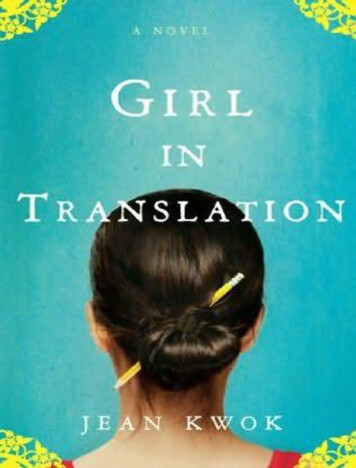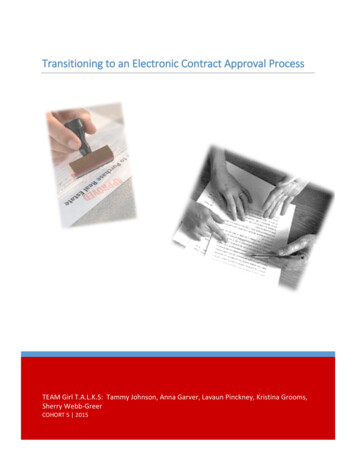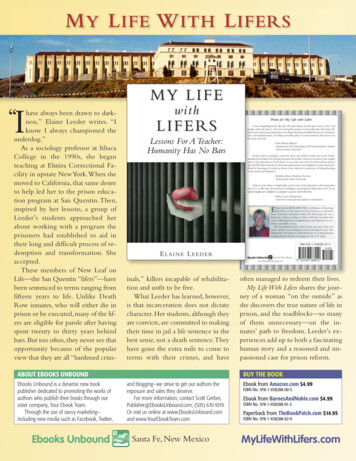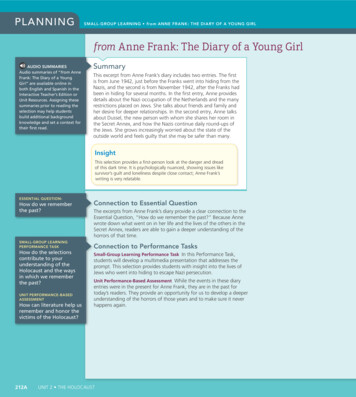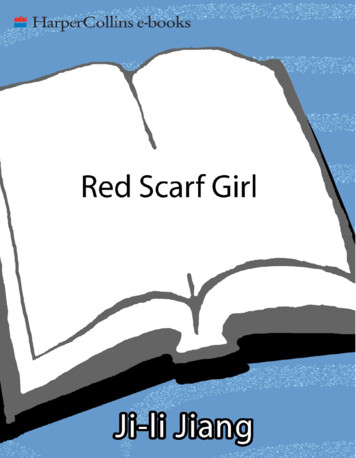
Transcription
RED SCARF GIRLA MEMOIR OF THECULTURAL REVOLUTIONJI LI JIANGFOREWORD BYDEVID HENRY HWANG
To my dearest Grandma,who would be so happy if shecould see this book
“Now, you have to choose between tworoads.” The man from the RevolutionaryCommittee looked straight into my eyes. “Youcan break with your family and followChairman Mao, or you can follow your fatherand become an enemy of the people.” Hisvoice grew more severe. “In that case wewould have many more study sessions, withyour brother and sister too, and the Red GuardCommittee and the school leaders. Thinkabout it. We will come back to talk to youagain.”He and the woman left, saying they wouldbe back to get my statement. Without knowinghow I got there, I found myself in a narrowpassageway between the school building andthe school-yard wall. The gray concrete wallsclosed around me, and a slow drizzledampened my cheeks. I could not go back tothe classroom, and I could not go home. I feltlike a small animal that had fallen into a trap,alone and helpless, and sure that the hunterwas coming.
ContentsNote to the ReaderNote on PronunciationForewordPrologueThe Liberation Army DancerDestroy the Four Olds!Writing Da-zi-baoThe Red SuccessorsGraduationThe Sound of Drums And GongsThe Propaganda WallA Search in PassingFateJunior High School at LastLocked Up
An Educable ChildHalf-City JiangsThe Class Education ExhibitionThe Rice HarvestThe Incriminating LetterSweepingEpilogueGlossaryAcknowledgmentsAbout the AuthorCopyrightAbout the Publisher
NOTE TO THE READERIn China people are usually called by theirsurnames rst. Thus, in this book you will seeJi-li Jiang called Jiang Ji-li by her teachersand friends. Usage of the rst name is reservedfor close friends and family.There are only one hundred surnames inChinese, so it is not unusual for people whoare not related to have the same name.Chinese women do not change their surnameswhen they marry, although they maysometimes be addressed by a married name asa sign of respect.A more detailed explanation of some of thewords, ideas, and people in this book may befound in the glossary at the back.
NOTE ON PRONUNCIATIONMost Chinese words written in English arepronounced as they are written, with someexceptions:The letter “c” whenfollowed by a vowel ispronounced “ts.”The letter “q” is pronounced“ch.”The letter “x” is pronounced“sh.”The letter “z” is pronounced“dz.”The letter combination “zh”is pronounced “j.”
FOREWORDWhen I was a small boy, my grandmother toldme about a distant uncle who was living inChina during the Cultural Revolution. Hepromised to send a picture of himself to hisrelatives in America. If conditions were good,he said, he would be standing. If they werebad, he would be sitting. In the photo he sentus, my grandmother whispered, he was lyingdown!As a Chinese American born in SouthernCalifornia, my perception of China’s CulturalRevolution was limited to stories that lteredout from the few relatives who had stayedbehind. As I grew older and China opened upto the West, I learned more. A friend whowent to China to teach English returned with araft of tales from survivors, each more horrible
than the last.The seeds of the Great Proletarian CulturalRevolution had been planted many yearsbefore it burst forth in 1966. Seventeen yearsearlier, in 1949, the charismatic revolutionaryMao Ze-dong led the Communist Party topower as the new leaders of China. Some,including my own grandparents with theirchildren, feared the Communists and ed tothe small o shore island of Taiwan. Manyprivileged Chinese chose to stay, however,motivated by a sincere belief that Mao Ze-dongwould bring great changes to a nationweakened by centuries of corrupt governmentand foreign invasion.And the Communists did alter China inmany positive ways. Before Mao’s liberation,my father remembers as a boy in the city ofShanghai seeing corpses of beggars lying in thestreets while the wealthy drove by inchau eured limousines. The Communistsworked for the bene t of the poor, and united
a nation shattered for decades into warringfactions. Increasingly, however, it became clearthat Mao Ze-dong, though an inspiring leaderand brilliant revolutionary, was less skilled inthe practical a airs of managing a country.Upon deciding that sparrows were harmful tothe rice crop, for instance, Mao ordered theChinese to hunt and kill them. While hisdirective did succeed in reducing the sparrowpopulation, he had neglected to consider thatbirds also eat bugs; suddenly, the nation wasbesieged by a plague of insects.By 1966 rivals such as President Liu Shao-qiwere gaining power and in uence within theCommunist Party. At the same time, Maohimself had become disillusioned with some ofthe revolution’s failures in transforming thenation. So the Cultural Revolution was bornout of both Mao’s genuine frustration and hisdesire to regain the upper hand in a powerstruggle that threatened his position. His callfor “perpetual revolution” mobilized young
people into Red Guards who would wage classwar against remnants of traditional society,both native and foreign. Mao’s strategy,however, ended up bringing untold su eringto those very masses in whose name the battlewas waged, as well as disabling an entiregroup of young people who are now known asthe “lost generation.” Ironically, had Mao diedbefore launching the Cultural Revolution, hewould surely be remembered today as a muchmore positive historical figure.Ji-li’s story made me experience the CulturalRevolution on a gut level. Had I been born inChina, I would have been nine years old in1966, just a year younger than Ji-li’s sister, Jiyun. I too would have faced many of the sameimpossible choices: to slander a good teacher,or be labeled an enemy of the people? Toreveal the location of a forbidden document,or risk its being discovered by the Red Guards?To betray my parents with lies, or ruin myown future?
Reading Ji-li’s book, I believe I understandmore deeply now what my distant uncle musthave felt the day he lay down, thinking of hisrelatives in America, and snapped that photo. Ican only hope I would have shown the samedecency and courage exhibited by Ji-li Jiang.Her actions remind me that, even underunbearable circumstances, one can still believein justice. And above all, love.—David Henry Hwang
PROLOGUEI was born on Chinese New Year.Carefully, my parents chose my name: Ji-li,meaning lucky and beautiful. They hoped thatI would be the happiest girl in the world.And I was.I was happy because I was always loved andrespected. I was proud because I was able toexcel and always expected to succeed. I wastrusting, too. 1 never doubted what I was told:“Heaven and earth are great, but greater still isthe kindness of the Communist Party; fatherand mother are dear, but dearer still isChairman Mao.”With my red scarf, the emblem of the YoungPioneers, tied around my neck, and my heartbursting with joy, I achieved and grew every
day until that fateful year, 1966.That year I was twelve years old, in sixthgrade.That year the Cultural Revolution started.
THE LIBERATION ARMY DANCERChairman Mao, our beloved leader, smileddown at us from his place above theblackboard. The sounds and smells of thetantalizing May afternoon drifted in throughthe window. The sweet breeze carried thescent of new leaves and tender young grass andrippled the paper slogan below ChairmanMao’s picture: STUDY HARD AND ADVANCE EVERY DAY. Inthe corner behind me the breeze also rustledthe papers hanging from the Students’ Garden,a beautifully decorated piece of cardboard thatdisplayed exemplary work. One of them wasmy latest perfect math test.We were having music class, but we couldn’tkeep our minds on the teacher’s directions. Wewere all confused by the two-part harmony ofthe Young Pioneers’ Anthem. “We are Young
Pioneers, successors to Communism. Our redscarves utter on our chests,” we sang over andover, trying to get the timing right. The oldblack pump organ wheezed and squeaked asimpatiently as we did. We made another start,but Wang Dayong burst out a beat early, andthe whole class broke into laughter.Just then Principal Long appeared at thedoor. She walked in, looking less serious thanusual, and behind her was a stranger, abeautiful young woman dressed in the People’sLiberation Army uniform. A Liberation Armysoldier! She was slim and stood straight as areed. Her eyes sparkled, and her long braids,tied with red ribbons, swung at her waist.There was not a sound in the classroom as allforty of us stared at her in awe.Principal Long told us to stand up. Thewoman soldier smiled but did not speak. Shewalked up and down the aisles, looking at usone by one. When she nished, she spokequietly with Principal Long. “Tong Chao and
Jiang Ji-li,” Principal Long announced. “Comewith us to the gym.” A murmur rose behind usas we left the room. Tong Chao looked at meand I looked at him in wonder as we followedthe swinging braids.The gym was empty.“I want to see how exible you are. Let melift your leg,” the Liberation Army woman saidin her gentle voice. She raised my right legover my head in front of me. “Very good! NowI’ll support you. Lean over backward as far asyou can.” That was easy. I bent backward untilI could grab my ankles like an acrobat. “That’sgreat!” she said, and her braids swung withexcitement.“This is Jiang Ji-li.” Principal Long leanedforward proudly. “She’s been studying martialarts since the second grade. She was on theMunicipal Children’s Martial Arts Team. Theirdemonstration was even filmed.”The Liberation Army woman smiledsweetly. “That was very good. Now you may
go back to your classroom.” She patted me onmy head before she turned back to test TongChao.I went back to class, but I could notremember the song we were singing. What didthe Liberation Army woman want? Could shewant to choose me for something? It was toomuch to contemplate. I hardly moved whenthe bell rang to end school. Someone told methat the principal wanted to see me. I walkedslowly down the hall, surrounded by myshouting and jostling classmates, seeing onlythe beautiful soldier, feeling only the electrictingle of her soft touch on my head.The o ce door was heavy. I pushed it opencautiously. Some students from the other sixthgrade classes were there already. I recognizedWang Qi, a girl in class two, and one of theboys, You Xiao-fan of class four. I didn’t knowthe other boy. The three of them sat nervouslyand respectfully opposite Principal Long. I
slipped into a chair next to them.Principal Long leaned forward from her bigdesk. “I know you must be wondering aboutthe Liberation Army soldier,” she said. Shesounded cheerful and excited. “Why did shecome? Why did she want you to do backbends?” She looked at us one by one and thentook a long sip from her tea mug as if shewanted to keep us guessing, “She wasComrade Li from the Central Liberation ArmyArts Academy.”I slowly took a deep breath.“She is recruiting students for the dancetraining class. She selected you four toaudition. It’s a great honor for Xin Er PrimarySchool. I’m very proud of all of you, and Iknow you’ll do your best.”I did not hear the rest of her words. I sawmyself in a new Liberation Army uniform, slimand standing straight as a reed, long braidsswinging at my waist. A Liberation Armysoldier! One of the heroes admired by all, who
helped Chairman Mao liberate China fromoppression and defeated the Americans inKorea. And a performer, just like my motherused to be, touring the country, the world, totell everyone about the New China thatChairman Mao had built and how it wasbecoming stronger and stronger.I couldn’t help giving Wang Qi a silly smile.“Mom! Dad! Grandma!” I panted up the steep,dark stairs, in too much of a hurry to turn onthe light, and tripped over some pots stored onthe steps. I couldn’t wait to tell them my news.1 knew they would all be as excited as I was.Our apartment was bright and warm andwelcoming. Burgundy curtains shut thedarkness outside and made the one big roomeven cozier. In front of the tall French windowour square mahogany table was covered withsteaming dishes and surrounded by my family,who were laughing and chattering when I
rushed in. They all looked up expectantly.“Everybody, guess what! Today a LiberationArmy woman came to school and she testedme and she wants me to audition for theCentral Liberation Army Arts Academy. Justthink! I could be in the Liberation Army! And Icould be a performer, too! Isn’t it great?” Ipicked up our cat, Little White, and gave her abig kiss.“It’s lucky I studied martial arts for so long.When the Liberation Army woman saw myback bend, she just loved it.” I twirled aroundon my toes and snapped my heels together ina salute. “Comrade Grandma, Jiang Ji-lireporting!”My younger brother, Ji-yong, jumped upfrom the table and saluted me. My little sister,Ji-yun, started to twirl around as I had done,but she slipped and fell. We jumped to thefloor with her and rolled around together.“Ji-li,” I heard Dad call. I looked up. Momand Dad and Grandma were looking at each
other solemnly. “It might be better not to dothe audition.” Dad spoke slowly, but his tonewas serious, very serious.“What?”“Don’t do the audition, Ji-li.” He lookedstraight at me this time, and sounded muchmore forceful.“Don’t do the audition? Why not?”Dad shook his head.I grabbed Mom’s arm. “Mom, why not?”She squeezed my hand and looked at meworriedly. “Your father means that therecruitment requirements are very strict.”“Wow. You really scared me, Dad.” Ilaughed with relief. “I know that. PrincipalLong told us it would be very competitive. Iknow it’s just an audition, but who knows? Imight be lucky, right?” I picked up a steamedbun and took a bite.“I’m not just talking about talent,” Dad said.“There are more important requirements,
political considerations ”“Oh, Dad, that’s no problem.” I took anotherbig bite of the bun. I was an OutstandingStudent, an Excellent Young Pione
I would be the happiest girl in the world. And I was. I was happy because I was always loved and respected. I was proud because I was able to excel and always expected to succeed. I was trusting, too. 1 never doubted what I was told: “Heaven and earth are great, but greater still is the kindness of the Communist Party; father and mother are dear, but dearer still is Chairman Mao.” With my .
